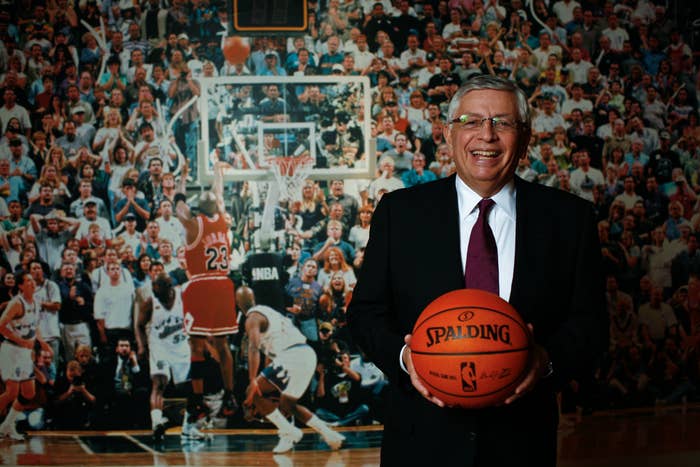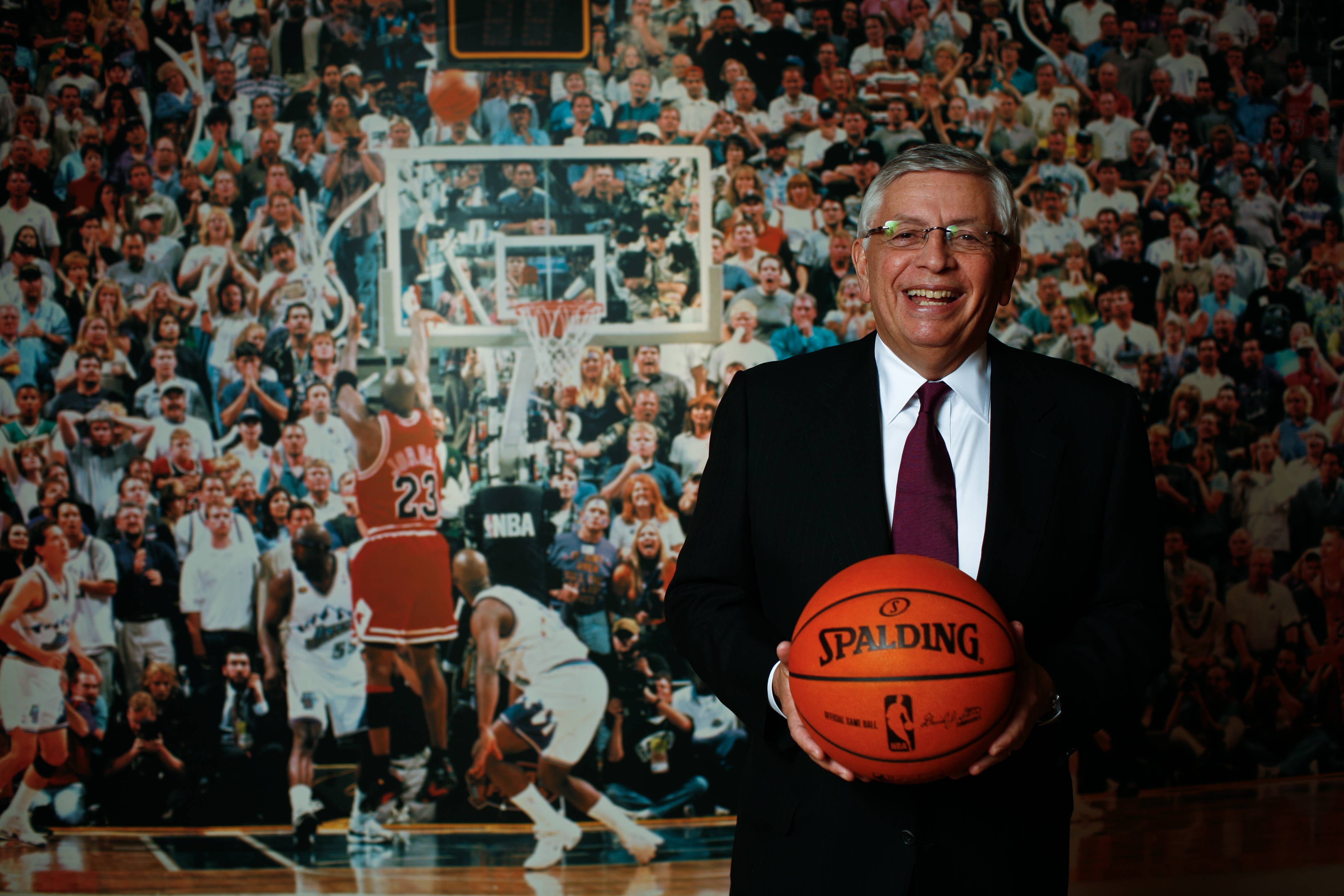
The 1984 NBA Draft, held in the Felt Forum at Madison Square Garden, was a revolution that was barely televised—it was shown on the USA Network in the middle of a weekday afternoon. What are today household names didn’t get beamed into many households. There were future Hall of Famers galore: Hakeem Olajuwon, Michael Jordan, Charles Barkley, and John Stockton. And there was also one more: the new commissioner, the man with the mustache announcing the picks. His name was David Stern.
Stern began working with the NBA as a freshly minted lawyer in 1966, was hired full-time by the League in 1978, and was named the NBA’s fourth Commissioner in 1984, serving for 30 years before stepping down in February of 2014. After that he was Commissioner Emeritus, ever-available to both his successor Adam Silver and nearly anyone else who wished to draw on his decades of hard-earned wisdom. Stern, who passed away at 77 on New Year’s Day following a December brain hemorrhage, was a vital part of the NBA for over 50 years, fully two-thirds of the league’s existence.
Stern could be a bit cranky, and was a formidable sparring partner whether one was on the other side of the bargaining table or on the other end of a phone call. In 2003, Lang Whitaker and I made the pilgrimage from the SLAM offices (where I was editor in chief) to Stern’s midtown office in Olympic Tower on 57th Street. He gave us a hard time, but importantly he let us know in no uncertain terms that he knew who we were and what we did. He always did his homework, and always expected you to have done yours. And of course he had visions for the future. “Getting people to know our players well, and fighting for the space in a very crowded sports and entertainment market,” he said in response to a question about the biggest challenge moving forward. “Because the game takes care of itself.”
If one were to sum up Stern’s 30 years at the helm in one word, it would have to be expansion. There were new teams, of course, like the Hornets and Heat in 1988, the Timberwolves and Magic in 1989, the Toronto Raptors and the Vancouver Grizzlies in 1995 and the Charlotte Bobcats in 2004. But there was also a matter of audience. Stern worked tirelessly to turn the NBA into a global game, from making TV deals in other countries to orchestrating 1992’s Dream Team. The National Pastime? Major League Baseball could have that. Stern’s vision was much broader.
He always did his homework, and always expected you to have done yours. And of course he had visions for the future. “Getting people to know our players well, and fighting for the space in a very crowded sports and entertainment market,” he said in response to a question about the biggest challenge moving forward. “Because the game takes care of itself.”
It started before he was even named commissioner. Stern became the NBA’s Executive Vice President in 1980, with a focus on marketing and television. Two years later, in 1982, the NBA signed new TV deals that landed games on both ESPN and USA Network—all this while CBS was still broadcasting playoff games on tape delay, a practice that wouldn’t end until 1986. The groundwork was being set for all that was to come. And Stern, a fervent believer in his players and his product, was a major driving force.
When it was announced in November of 1983 that Stern would be taking over as commissioner the following year, there was another bit of business on the same phone call. The Seattle Supersonics were being sold, and the League had to sign off. Sam Schulman sold the team to Barry Ackerley for a reported $22 million. Twenty-three years later, in October of 2006, Starbucks founder Howard Schulz sold those same Supersonics to Oklahoma City businessman Clay Bennett for $350 million. Three months after Stern stepped down as commissioner, in May of 2014, former Microsoft CEO Steve Ballmer bought the Los Angeles Clippers for $2 billion.
Expansion, right? Of franchise value, of attention, of salaries. In the 1984-85 season, the first with a salary cap, Magic Johnson was the league’s highest-paid player at $2.5 million. This year it’s Steph Curry at $37.4 million. I haven’t done the math, but I’m pretty sure that’s outpaced the rate of inflation.
Stern represented the owners—most evident during work stoppages during the 1998-99 and 2011-12 seasons—he always understood that the players were the focal point. This perhaps explains some of his missteps as well, whether it was the lengthy suspensions following the Malice at the Palace between the Pacers and the Pistons in 2004, the introduction of a dress code in 2005, or the age limit imposed that same year. With great power comes great responsibility, something Stern expected his players to uphold as well.
As for the players, they genuinely loved and respected him, And as news of his death got out, they posted their tributes. From Magic Johnson and Michael Jordan to Kobe Bryant and LeBron James, superstars from every era he transcended. Even Chris Paul—who not only faced off with Stern during the 2011 lockout and was later voted head of the Player’s Union but also saw his trade to the Los Angeles Lakers that same year voided by Stern for “basketball reasons”—paid his respects.
Stern’s legacy is a complicated one—yes, the Sonics left Seattle, but the Kings stayed in Sacramento and the Hornets returned to New Orleans post-Katrina—but he left the league far better for his stewardship. He established the WNBA in 1996, turned the All-Star Game from a mere game into a near week-long spectacle, established the Draft Lottery (and fixed it the first year, maybe), and paved the way for a true minor league. His embracing, both literal and figurative, of Magic following his HIV announcement, was a moment that transcended sports. Stern also served long enough to watch some of the seeds he planted bear fruit—those international broadcasts and Dream Team triumphs led directly to the likes of Manu Ginobili and Dirk Nowitzki thriving in the NBA. And then there’s China, which, Daryl Morey Tweet aside, brought not only Yao Ming to the Rockets, but the NBA to literally a billion more fans.
For most of us, Stern was the only NBA commissioner we ever knew, as inseparable from the league as the logo. Now that he’s gone, it’s nearly impossible to imagine the NBA without him. It’s even more impossible to imagine where the NBA would be today had he never been.

